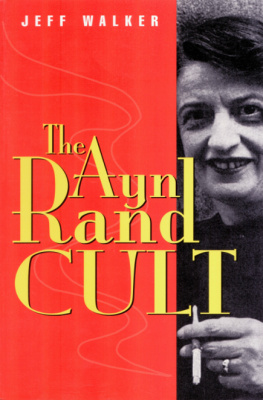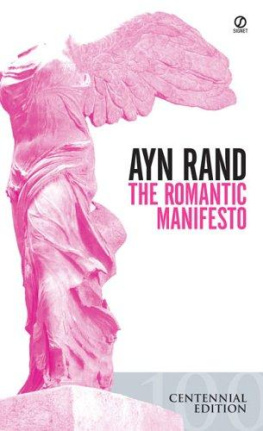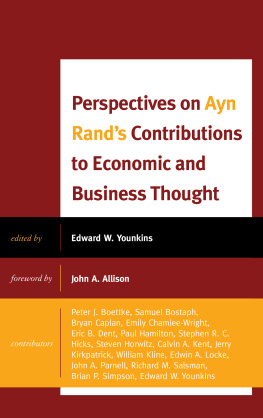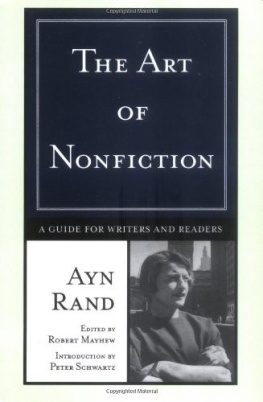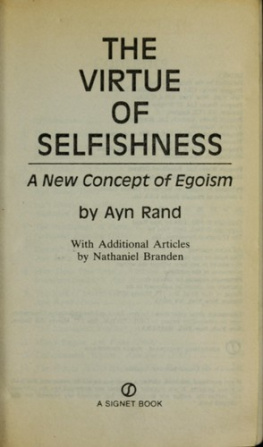Reaction to The Ayn Rand Cult
Library Journal: valuable and original contribution to Rand studies... [Jeff Walkers] analytical perspective avoids the common extremes of hagiography and vilification that mark many accounts of Rands schismatic movement. Walker also does a credible job of placing Rands ideas in the context of philosophies that preceded and followed her, and offers insightful chapters on three of her major followers: Branden, Leonard Peikoff, and Alan Greenspan. His account is well researched and clearly written,... a solid contribution to 20th-century intellectual history.
Publishers Weekly: devastating... a useful corrective to the Rand mystique.
Utne Reader: The Rand boom is made all the livelier by [Jeff Walker]... he makes a case. Its hard not to see the abject Rand-worship, the intellectual rigidity, the emotional abuse, and the traitor-hunting that have plagued orthodox objectivism in the same light as the excesses of Scientology or the Unification Church.
Robert Fulford(Globe and Mail):an absorbing portrait of the still-thriving Rand movement.... provides some striking glimpses of the Randians.
Kirkus Reviews: Walker does not stop at characterizing Rand as a cultist.... he does convey vividly the frightful mess that was Ayn Rand.
Chris Sciabarra(Full Context):Walkers central theoretical points need to be grappled with.... valuable insights on the dangers of cults and of Rands intellectual roots.
Laissez Faire City Times:... heres the bottom line. Buy a copy of Walkers encyclopedic assault on Objectivism.
Frankfurter Allgemeine Zeitung(GermanysWall Street Journal):a detailed and often highly interesting expos-biography.
Canadian Forum: a bracing assault on the provocative author and philosopher.
Bill Bradford(Liberty):comprehensive... [Jeff Walker] interviewed more than two dozen participants in Rands affairs and tracked down hundreds of written sources, many of them obscure.... And there is some pretty interesting stuff.
The
Ayn Rand Cult
JEFF WALKER

OPEN COURT
Chicago and La Salle, Illinois
To order books from Open Court,
call toll-free 1-800-815-2280.
Open Court Publishing Company is a division of Carus Publishing Company.
Copyright 1999 by Carus Publishing Company
First printing 1999
Second printing 1999
All rights reserved. No part of this publication may be reproduced, stored in a retrieval system, or transmitted, in any form or by any means, electronic, mechanical, photocopying, recording, or otherwise, without the prior written permission of the publisher, Open Court Publishing Company, 315 Fifth Street, P.O. Box 300, Peru, Illinois 61354-0300
Library of Congress Cataloging-in-Publication Data
Walker, Jeff, 1952-
The Ayn Rand cult / Jeff Walker.
p. cm.
Includes bibliographical references (p.) and index.
ISBN 978-0-8126-9819-0
1. Rand, AynAppreciationUnited States. 2. FictionAppreciationUnited StatesHistory20th century. 3. Women and literatureUnited StatesHistory20th century. 4. Authors and readersUnited StatesHistory20th century 5. United StatesIntellectual life20th century. 6. Philosophy and literature. 7. Objectivism (Philosophy) I. Title.
PS3535.A547Z97 1999
To my late parents,
Robert M. Walker and Ruth E. Walker,
and to Anne
Contents
Ayn Rand (19051982) was a remarkable phenomenon in American cultural life. She wrote two popular novels which not only became best-sellers, but continue to sell decades later. She attracted adherents to some ideas which had been unduly neglected and which would later come into their own again. She stimulated many young people to think about important issues, and unlike some modern writers who have attracted a devoted following, she did not try to impress with mystifying terminology: whatever you may think of Rands arguments, they are always clearly and forcefully expressed. She helped to break down the barrier between pop culture and serious intellectual debate.
There are many books and articles which expound Rands ideas, either to advocate them or to criticize them, and there will be many more. This book doesnt compete with those works: it is not primarily an examination of the doctrinal content of Objectivism. It would be missing the point of The Ayn Rand Cult to see it as primarily an attempt to refute Rands theories. There are points where I agree with Rand and points where I disagree with her, but I am mainly concerned with the fact that Rands movement became a cult, that it functioned like a typical cult, and that this caused considerable unnecessary unhappiness for many people. The identification of the organized Objectivist movement as a cult has been made repeatedly over the years by a great many individuals who consider themselves Objectivists in all essentials, and who hold a much higher estimation of Rands attainment as a thinker than I do. The cultishness of a cult is not changed by the correctness or incorrectness of some of its teachings, or even of all of them.
The official Objectivist movement, led at first by the Nathaniel Branden Institute, and today by the Ayn Rand Institute, has played a very important role in the history of Objectivism. But it has always been true, and is now more true than ever, that the number of sympathizers with and admirers of Rands ideas outside the official movement has greatly exceeded the number of those affiliated with it. There are many people who have been affiliated with an Objectivist group and have then left or been ejected. Most often, they then still think of themselves as Objectivists. There are many others, influenced by Rands writings, who have never had any formal affiliation, but who are freelance Objectivists. To keep things simple, I refer to all the people in both these categories as neo-Objectivists.
Obviously, the people I call neo-Objectivists do not all agree on everything, and if I cite one of them in support of some point I am making, it does not follow that other neo-Objectivists will agree with that point. Nor does it follow that a neo-Objectivist quoted in support of some point I am making will necessarily agree with any other point I make elsewhere in the book. Nothing I say here is meant to suggest that all neo-Objectivists are cultists. Many of them certainly are not, which often helps to explain why they never joined, or why they voluntarily or involuntarily left, Objectivist organizations. Nevertheless, I do not think that Objectivism is a neutral doctrine which by bad luck happened to become the doctrine of a cult: I show that many aspects of Rands thinking are conducive to cultishness.
It was during my research for a Canadian Broadcasting Corporation (CBC) two-hour radio program on Rand, aired in 1992, that I began to sense that the closer to Rand a given follower was, the less real perspective he or she had on Rand, even after time and distance had separated them. The Brandens seemed so branded by their prime years at her knee that no other mindset could subsequently dislodge Rands. The same appeared true for the other former members of her entourage, if to a lesser extent.

